Recently, at the end of the school year, many parents have shared information such as their children's report cards, certificates, schools, classes, names, etc. on social networks without knowing that this will help bad guys easily access their children's personal information, which can lead to fraud.
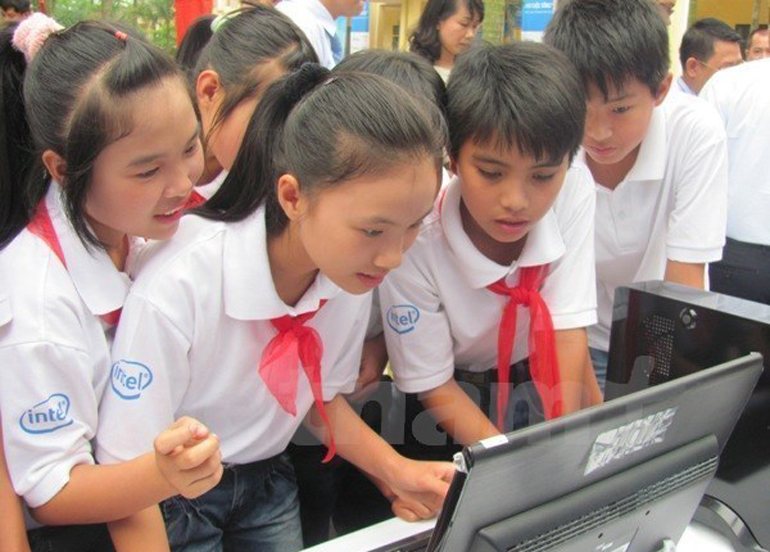 |
| Children are spending more and more time using the Internet and facing potential risks of the Internet. Illustration photo: Vietnam+ |
This situation shows that parents still lack knowledge about protecting children's privacy and information as well as skills to protect children on social networks.
The risk of children's information leakage
Ms. Dinh Thi Nhu Hoa, Head of the Vietnam Cyber Emergency Response Center, Department of Information Security ( Ministry of Information and Communications ) said that one of the dangers affecting children is the dissemination and leakage of private information and personal information of children on the internet.
According to Ms. Dinh Thi Nhu Hoa, sometimes parents are the ones who share information and images of their children carelessly and without control on social networks and forums... This can lead to many negative effects on children.
Ms. Nguyen Thi Nga, Deputy Director of the Department of Child Protection ( Ministry of Labor, Invalids and Social Affairs ) said that the current legal system in our country on children's privacy and the contents related to children's privacy have been stipulated in the Law on Children. However, from regulations to become knowledge and skills of ourselves, including parents and children, is not easy.
In reality, although adults are equipped with a lot of knowledge and skills, when someone calls and clearly states their child's name, school, and class, they usually believe it immediately. There are cases where scammers ask young girls to do some simple actions following a model and entice them that if they do, they will be given a cup of milk tea, lipstick, etc.
"This shows that people with bad intentions online understand the psychology of children and parents very well," said Ms. Nguyen Thi Nga.
According to Ms. Nguyen Thi Nga, to prevent fraud and enticing children through their personal information being leaked, the most important thing is the real concern of parents and family members. Parents themselves must also equip themselves with "digital skills" to protect children.
"It is the relatives who will accompany the children, from identifying and determining risks, and if the children are deceived through leaked personal information, parents and teachers must always share with them, to minimize the harm and unfortunate things that happen to the children," said Ms. Nguyen Thi Nga.
Many potential risks
The development of information technology and the internet brings many benefits, but also comes with risks for children, especially in the digital age, digital era, and digital citizenship like today. Children spend more and more time using the internet for many different purposes such as (studying; watching movies; using social networks, following public figures; searching for information; chatting with friends, relatives, etc.). This also puts children at risk of many potential risks.
According to Mr. Nguyen Ngoc Anh, expert of the Child Protection Program of the United Nations Children's Fund (UNICEF), children face different risks and new forms of harm in cyberspace.
Taking the issue of bullying as an example, Mr. Nguyen Ngoc Anh pointed out that in real life, when bullied, the perpetrator is usually someone stronger and may be accompanied by physical violence. However, online, children can be ridiculed, teased, criticized, insulted or commented maliciously by netizens, even attacked, threatened, and humiliated...
“Children can be victims, recipients, participants or initiators of these online behaviors,” Mr. Nguyen Ngoc Anh emphasized.
Regarding the handling of online child abuse cases, Senior Lieutenant Le Nhat Thinh, Department of Cyber Security and High-Tech Crime Prevention, Ministry of Public Security said that in the first quarter, local police coordinated to investigate and verify the handling of 135 cases of subjects who committed acts of child abuse through the internet environment. Of which, there were 116 cases of... child sexual abuse; there were 13 cases of children having information about their private lives, information about humiliation, information about their dignity and honor being spread online...
A05 is currently requesting the blocking of 10,000 websites with obscene and harmful content for children... Local police have also dismantled networks where children are bought and sold through adoption or surrogacy.
“Number vaccine” for children
Child abuse through the online environment is just as dangerous as in real life, because the content and images spread on the internet can appear at any time, causing lasting damage to children. According to the representative of the Information Security Department, children need a powerful and effective tool to filter online content, helping them not to be "exposed" to bad and toxic information.
“Current tools are limited to image and text processing, while video processing requires complex technology, and there are almost no filtering tools. Therefore, parents need to consider letting their children watch videos from the internet, and at the same time use content filtering tools to protect children as much as possible in the online environment,” Ms. Dinh Thi Nhu Hoa warned.
Mr. Dang Hoa Nam, Director of the Department of Children (Ministry of Labor, Invalids and Social Affairs) emphasized the solution of creating a "Digital Vaccine" to protect children in the online environment; welcomed software initiatives to block, filter, remove, and monitor children's internet use at home and at school.
"However, I encourage 'digital vaccines' to be created from technical solutions as well as knowledge and skills of parents and teachers to accompany children, skills to respect children's privacy and respect children's opinions. Only then will 'digital vaccines' be sustainably accepted by children," Mr. Dang Hoa Nam shared.
According to the report of the National Child Protection Hotline 111: In 2022, the Hotline received nearly 420 calls about child protection on the internet and 18 reports about channels/video clips with content harmful to children.
In the first 5 months of 2023 alone, Hotline 111 received nearly 130 calls about child protection on the internet and 3 reports about channels/video clips with harmful content for children. Of the nearly 130 calls, there were more than 120 consultation calls and 4 cases of connection and intervention for children being abused on the internet. |
According to VNA/Vietnam+
Source link


![[Photo] Scientific workshop "Building a socialist model associated with socialist people in Hai Phong city in the period of 2025-2030 and the following years"](https://vphoto.vietnam.vn/thumb/1200x675/vietnam/resource/IMAGE/2025/5/21/5098e06c813243b1bf5670f9dc20ad0a)
![[Photo] Prime Minister Pham Minh Chinh receives Rabbi Yoav Ben Tzur, Israeli Minister of Labor](https://vphoto.vietnam.vn/thumb/1200x675/vietnam/resource/IMAGE/2025/5/21/511bf6664512413ca5a275cbf3fb2f65)


![[Photo] Determining the pairs in the team semi-finals of the National Table Tennis Championship of Nhan Dan Newspaper](https://vphoto.vietnam.vn/thumb/1200x675/vietnam/resource/IMAGE/2025/5/21/eacbf7ae6a59497e9ae5da8e63d227bf)
![[Photo] Prime Minister Pham Minh Chinh attends the groundbreaking ceremony of Trump International Hung Yen Project](https://vphoto.vietnam.vn/thumb/1200x675/vietnam/resource/IMAGE/2025/5/21/ca84b87a74da4cddb2992a86966284cf)



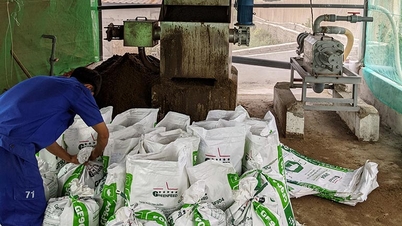



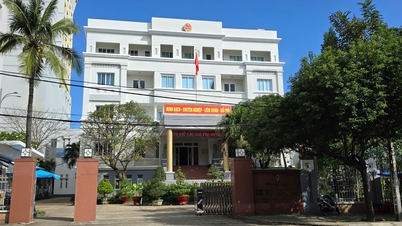



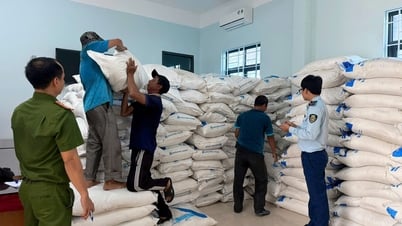
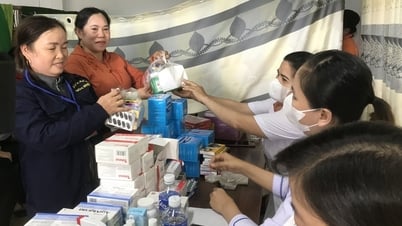



























































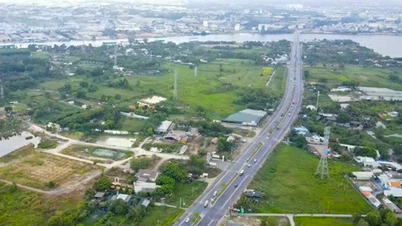














Comment (0)